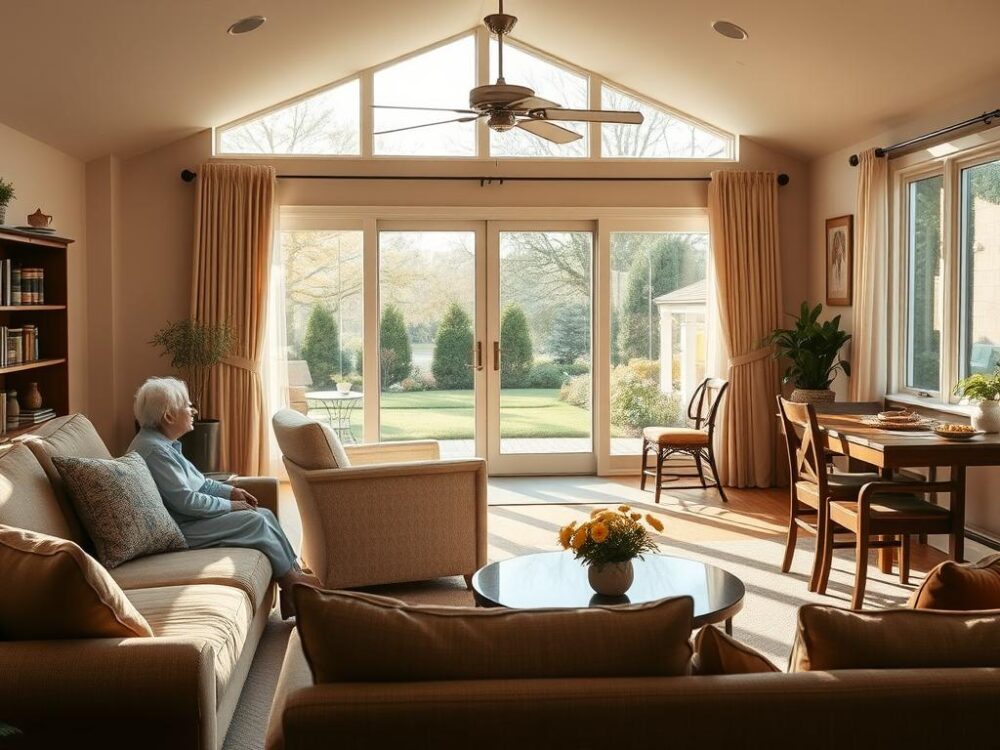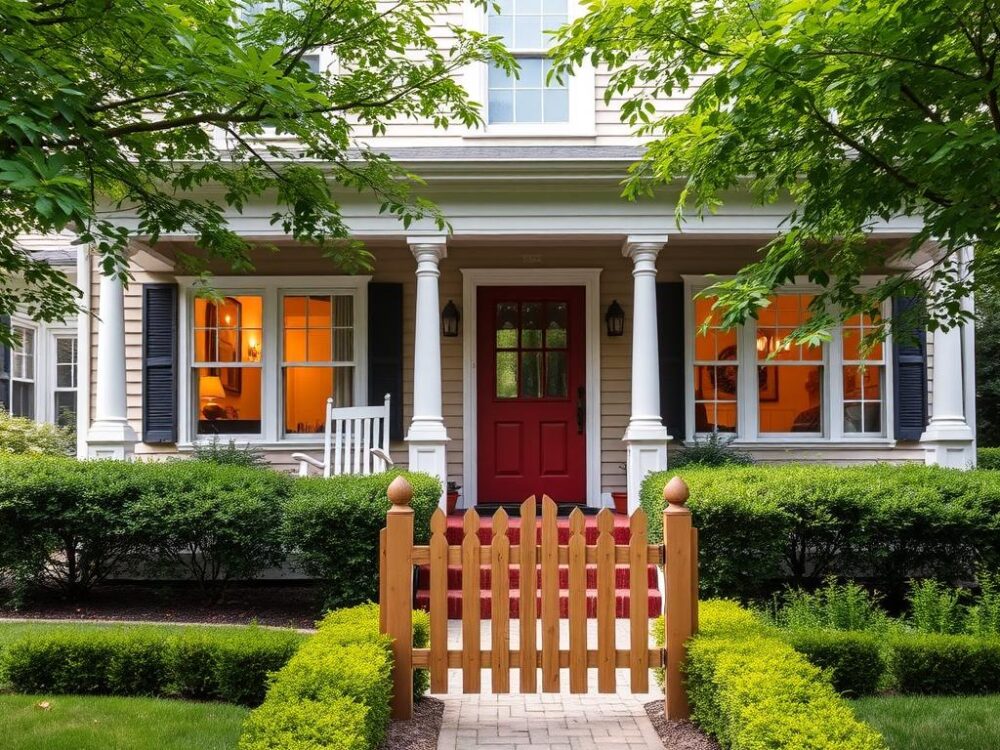
Find Assisted Living Facilities Near Me Now
March 5, 2024
Find Top Care Facilities Near Me | Quick Search
March 5, 2024Welcome to our comprehensive guide on assisted living for seniors. If you or a loved one requires additional support with the activities of daily living, such as bathing, dressing, or medication management, assisted living can provide the safety, comfort, and vibrant community you need.
In assisted living facilities, seniors receive 24-hour support and personalized care plans to ensure their well-being and independence. These facilities offer a range of services, including meals, housekeeping, transportation, and engaging social activities. Here, seniors can enjoy the benefits of a caring community while receiving the care they need.
Throughout this guide, we will explore various aspects of assisted living, from what it is and how to determine if it’s the right option for you, to signs that assisted living may be needed and emotional considerations during the transition. We will also provide valuable insights on choosing the right facility, understanding what to expect, and the cost associated with assisted living.
Whether you are considering assisted living for yourself or a loved one, this guide aims to provide you with the information and guidance you need to make an informed decision. Let’s embark on this journey together to discover the world of assisted living for seniors.
What is Assisted Living?
Assisted living is a residential option for older adults who need help with the activities of daily living. It provides personal care services, round-the-clock support, and access to care 24/7. Assisted living facilities are residential facilities that offer a range of services to promote independence in a supportive environment. These facilities can vary in size and shape, from converted homes to renovated schools, but they all share the common goal of providing a residential facility for seniors who require additional assistance while maintaining their independence.
Assisted living facilities offer a variety of services to cater to the individual needs of residents. These services may include assistance with bathing, dressing, medication management, and meal preparation. The staff members are trained professionals who are available round-the-clock to provide support and ensure the safety and well-being of residents. Additionally, assisted living facilities often offer social activities, transportation services, and housekeeping to enhance the quality of life for residents.
The main focus of assisted living is to strike a balance between independence and assistance. It allows seniors to maintain their privacy and freedom while receiving the necessary care and support they require. Whether it’s help with daily activities, personal care, or access to professional medical assistance, assisted living offers a residential option that promotes independence and provides a safe and comfortable living environment for older adults.
Services typically provided in an assisted living facility:
- Personal care services (bathing, dressing, grooming)
- Medication management
- Meal preparation and dining services
- Housekeeping and laundry services
- Scheduled transportation
- 24/7 staff availability
- Social activities and recreational programs
Is Assisted Living Right for You?
Assisted living can be a suitable choice if you require more assistance with the activities of daily living than what your family and friends can provide. These facilities offer personal care services, which can help alleviate stress and overwhelm in your daily routine.
One of the significant advantages of assisted living is the vibrant social life it offers. Seniors often experience loneliness and isolation at home, but in an assisted living community, they can find a sense of belonging and opportunities to make new friends.
If you worry about your safety at home or find it challenging to maintain your home, assisted living can provide a secure environment where your safety is a priority. These facilities offer a range of safety measures to ensure the well-being of their residents.
Transportation can also be a concern as you age. Assisted living facilities often provide transportation services, making it easier for you to attend medical appointments, social activities, and run errands.
Ultimately, the decision to move to an assisted living facility requires careful consideration. Evaluating your current needs and preferences, as well as the benefits of assisted living, can help you make an informed decision.Let the image below give you a visualization of the assisted living environment:
- If you need more help than your family and friends can provide with the activities of daily living.
- If you feel lonely or isolated at home and desire a vibrant social life.
- If you worry about your safety at home or find it challenging to maintain your home.
- If transportation is a concern and you require reliable transportation services.
Signs that Assisted Living May Be Needed
There are several signs that may indicate it’s time to consider assisted living for yourself or a loved one. These signs include:
- An empty or spoiled refrigerator: A refrigerator that is consistently empty or filled with expired or spoiled food may indicate difficulty with grocery shopping or meal preparation.
- Frequent bruises: Unexplained bruises or injuries could be a sign of mobility issues or increased risk of falls, which may require assistance or supervision.
- Neglect of personal hygiene and cleanliness: Poor personal hygiene, unkempt appearance, or a dirty living environment may suggest difficulty with self-care and maintaining a clean living space.
- Forgetfulness: Memory loss or frequent forgetfulness that affects daily tasks, medication management, or safety could be an indication of cognitive decline or the need for assistance.
- Depression: Persistent feelings of sadness, withdrawal from social activities, or loss of interest in hobbies may signal the need for additional support and social connection.
- Strange or inappropriate behavior: Uncharacteristic behavior such as agitation, wandering, paranoia, or exhibiting inappropriate social behaviors may be a sign of cognitive impairment or emotional distress.
These signs may indicate difficulty with daily tasks and personal care, as well as potential safety concerns. It’s important to pay attention to these signs and have a conversation about the possibility of assisted living. Assisted living facilities can provide the necessary support and care to ensure a safe and fulfilling lifestyle for seniors who need assistance.

Emotional Considerations of Moving to Assisted Living
Moving to an assisted living facility can have a significant emotional impact on individuals. This transition involves leaving behind familiar surroundings and a sense of identity, which can evoke feelings of grief, loss, and vulnerability. It is important to acknowledge and process these emotions in order to navigate the transition effectively.
When moving to an assisted living facility, individuals may experience grief and a sense of loss for their previous living arrangements, independence, and daily routines. This is a normal and natural response to significant life changes. Take the time to honor and grieve these losses, allowing yourself to process the emotions associated with this transition.
Moving to assisted living can also lead to feelings of vulnerability. Individuals may worry about their ability to adapt to new surroundings, establish connections with others, and maintain a sense of control over their lives. Recognize that vulnerability is a shared experience and an opportunity for growth as you adjust to this new chapter.
It is crucial to develop coping strategies to navigate the emotional impact of moving to assisted living. Seek support from friends, family, or a supportive community who can provide empathy and understanding during this period of change. Consider connecting with professionals such as therapists or counselors who can offer guidance and assistance in processing your emotions.
While the emotional impact of moving to assisted living may be challenging, it is essential to remain open to the opportunities for personal growth and new experiences. Embrace the chance to build new relationships, discover new hobbies and interests, and create a sense of belonging within the assisted living community. With time, you can establish a new identity and find fulfillment in this new chapter of your life.
Making the Transition to Assisted Living Easier
Transitioning to assisted living can be a challenging process, but with careful planning and support, it can be made easier. Here are some steps you can take to facilitate a smoother transition:
Pack Well in Advance
Start packing your belongings well in advance of your move to avoid last-minute stress. Take the time to sort through your possessions and decide what you want to bring with you to your new assisted living facility. This will not only help you stay organized but also ensure that you have everything you need in your new living space.
Manage Your Expectations
Do thorough research on the assisted living facility you will be moving to. Familiarize yourself with the amenities, services, and community atmosphere they offer. By setting realistic expectations, you can better prepare yourself mentally for the transition. Don’t hesitate to ask questions and seek clarification to ensure you have a clear understanding of what to expect.
Stay Busy and Get Involved
One way to make the transition smoother is to stay busy and get involved in activities offered by the assisted living facility. Participating in social activities and engaging with other residents can help you establish new connections and feel more at home in your new environment. Keeping yourself busy can also help distract from any initial discomfort or homesickness.
Practice Self-Care
During this transition, it’s essential to prioritize self-care. Take time for yourself and engage in activities that bring you joy and relaxation. Maintain a routine that includes exercise, hobbies, and self-reflection. Practicing self-care will help you maintain a positive mindset and cope with any challenges that may arise during the transition.
Seek Support if Needed
Transitioning to assisted living can be an emotionally and mentally challenging experience. Don’t hesitate to reach out for support from family, friends, or professional counselors. Talking about your feelings and concerns can provide you with the guidance and reassurance you need during this time of change.
By following these steps and giving yourself time to adjust, the transition to assisted living can become smoother and more manageable. Remember to be patient, stay positive, and take advantage of the support and services available to you in your new assisted living community.
Choosing the Right Assisted Living Facility
When it comes to selecting an assisted living facility, there are several crucial factors to consider. These include amenities, the professionalism and friendliness of the staff, staffing levels and qualifications, resident satisfaction, the overall facility environment, and financial considerations.
Firstly, it’s essential to find a facility that offers the amenities that are important to you. Whether it’s a fitness center, beauty salon, library, or outdoor space, ensure that the facility provides the services and activities that align with your interests and preferences.
The staff of an assisted living facility plays a vital role in creating a positive and supportive environment. Look for a facility with friendly and caring staff members who are professional and respectful in their interactions with residents. It’s essential to consider the qualifications and experience of the staff to ensure that their expertise meets your specific needs.
Staffing levels are another critical aspect to evaluate. Adequate staffing ensures that residents receive the attention and care they require. Ample staff-to-resident ratios contribute to the overall satisfaction and well-being of the residents.
When researching an assisted living facility, it is crucial to gauge resident satisfaction. Look for feedback and testimonials from current and former residents to gain insights into their experiences. Positive reviews and high levels of resident satisfaction are indicators of a well-managed and thriving community.
The overall environment of the facility is also significant for your well-being. Visit the facility in person to assess its cleanliness, safety, and ambiance. A clean and well-maintained environment promotes a comfortable and pleasant living experience.
Financial considerations play a pivotal role in the decision-making process. Evaluate the cost of the facility, including monthly fees, additional services, and any potential hidden charges. Consider your budget and ensure that the facility’s price aligns with your financial capabilities.
Lastly, conduct thorough research on the facility’s track record and reputation. Look for any awards, accreditations, or recognition that the assisted living facility has received. Also, examine any complaints or regulatory violations that might affect the facility’s credibility.
By carefully considering these factors, you can choose the right assisted living facility that meets your needs and provides a vibrant and comfortable community for you to thrive in.
What to Expect in Assisted Living
In an assisted living facility, you can expect a range of services and amenities that cater to the needs of older adults. These services are designed to provide comfort, convenience, and assistance with daily tasks, allowing residents to maintain their independence while receiving the care they require. Here is what you can expect when transitioning to an assisted living community:
Assistance with Daily Chores
- Assisted living facilities provide assistance with daily chores such as housekeeping, laundry services, and meal preparation. This ensures that residents have a clean and organized living space without the burden of household tasks.
Access to Medical Care
- Medical care is readily available in assisted living communities. Trained staff members are on-site to help with medication management, monitor health conditions, and assist with any necessary medical appointments. This ensures that residents receive the care they need in a timely manner.
Social Activities
- Assisted living facilities offer a variety of social activities to promote engagement and companionship among residents. These activities may include group outings, exercise classes, game nights, and cultural events. Social interaction is encouraged to foster a vibrant and supportive community.
Staff Availability
- The staff in assisted living facilities are available to residents around the clock. They are ready to assist with scheduled needs such as medication reminders or help with daily tasks, as well as address any emergencies that may arise. The presence of trained staff provides a sense of security and peace of mind.
By choosing assisted living, you can benefit from a range of services and amenities that promote a comfortable and fulfilling lifestyle. From assistance with daily chores and access to medical care, to engaging social activities and readily available staff, assisted living facilities strive to meet the unique needs of each resident. It is important to have a clear understanding of the services and level of care provided by the facility before making a decision. Moving to an assisted living community can provide the support and peace of mind you or your loved one deserves.
Cost of Assisted Living
When considering assisted living, it’s important to understand the cost associated with this type of care. The cost of assisted living can vary depending on several factors that include:
- Location: Assisted living facilities in different regions or cities may have varying costs due to differences in the cost of living.
- Amenities: The amenities provided by the facility can impact the cost. Facilities offering more extensive amenities may have higher monthly fees.
- Size of the Facility: The size of the facility can affect the cost. Larger facilities may have higher operating costs, which can be reflected in the monthly fees.
- Staff Ratio: The number of staff members available to assist residents can influence the cost. A higher staff ratio may result in higher fees.
- Level of Care Required: The level of care needed by each resident can impact the cost. Individuals requiring more intensive assistance or specialized care may have higher fees.
The median monthly cost of assisted living in the United States is approximately $4,300. However, it’s important to note that this can vary significantly depending on the specific facility and its geographical location.
Assisted living communities typically charge a monthly fee that covers basic services such as meals, housekeeping, and transportation. However, additional fees may apply for extra services or amenities that are not included in the basic package.
For those who need financial assistance in covering the cost of assisted living, there may be options available. Long-term care insurance, veterans’ benefits, and Medicaid are potential sources of financial support. It’s important to explore these options and determine eligibility early in the decision-making process.
Understanding the cost of assisted living and exploring potential financial assistance options can help individuals and families make informed decisions about their long-term care needs.
Assisted Living in Las Vegas
Las Vegas, known for its vibrant nightlife and entertainment options, is also a popular retirement destination for older adults. With its mild winters, abundance of amenities, and lower cost of living compared to other retirement hotspots, it offers a compelling option for seniors considering assisted living.
The city of Las Vegas is committed to the well-being and safety of its residents, including those in assisted living facilities. These facilities are regulated by the state and must meet specific licensing requirements to ensure quality care and services.
In Las Vegas, there are over 200 assisted living communities to choose from, providing a range of options in terms of location, amenities, and services. Whether you prefer a facility close to the famous Las Vegas Strip or one nestled in a peaceful neighborhood, there is a community to suit your preferences.
When considering assisted living in Las Vegas, it’s crucial to research and evaluate specific facilities based on your needs and preferences. Take into account factors such as cost, regulations, and the overall fit with your lifestyle. Look for amenities that align with your interests and activities that promote an engaging and fulfilling social life.
- Population Growth: With a growing population of older adults, Las Vegas has become a thriving community for retirees seeking social connections and a vibrant lifestyle.
- Amenities: Las Vegas offers a plethora of amenities, ranging from world-class dining and entertainment options to outdoor recreational activities and cultural attractions.
- Cost of Living: Compared to other popular retirement destinations, Las Vegas has a lower cost of living, allowing seniors to make the most of their retirement savings.
- Regulations and Licensing Requirements: Assisted living facilities in Las Vegas are regulated by the state, ensuring that they meet specific standards of care and maintain the safety and well-being of their residents.

Conclusion
Assisted living can offer seniors a safe and fulfilling lifestyle, providing the necessary support for their daily tasks. When making the decision to move to an assisted living facility, it is crucial to carefully consider your needs, preferences, and budget. Take the time to research and visit different facilities, ask questions, and contemplate the emotional impact of the transition.
Assisted living facilities provide a supportive community that promotes a vibrant social life for seniors. Access to care and personalized assistance ensure their well-being and comfort. By selecting the right assisted living facility, seniors can enjoy a fulfilling lifestyle that meets their unique needs and allows for continued independence.
Factors such as cost, amenities, and emotional considerations should be taken into account in the decision-making process. Budgeting plays a significant role, while emotional considerations, such as the impact of leaving familiar surroundings, should not be overlooked. Understanding the available options through research and consultations can guide you towards the best decision for yourself or your loved one.
FAQ
What is assisted living?
Assisted living is a residential option for older adults who need help with the activities of daily living. It provides 24-hour support, personalized care plans, and a balance between independence and assistance.
Is assisted living right for you?
Assisted living may be the right choice if you need more help than your family and friends can provide with the activities of daily living. It can also be beneficial if you feel lonely or isolated at home, worry about your safety, or find maintaining a home challenging. Transportation services are often available in assisted living facilities.
What are the signs that assisted living may be needed?
Signs that may indicate it’s time to consider assisted living include an empty or spoiled refrigerator, frequent bruises, neglect of personal hygiene and cleanliness, forgetfulness, depression, and strange or inappropriate behavior.
What emotional considerations should be taken into account when moving to assisted living?
The transition to assisted living can have an emotional impact, as it involves leaving behind familiar surroundings and a sense of identity. It’s important to acknowledge and process these emotions, whether through talking to someone supportive or seeking therapy or counseling.
How can I make the transition to assisted living easier?
Steps to make the transition easier include packing well in advance, managing expectations by doing research and asking questions, staying busy and getting involved in activities, and practicing self-care and seeking support if needed.
What factors should I consider when choosing an assisted living facility?
When choosing an assisted living facility, it’s important to consider factors such as amenities, the friendliness and professionalism of the staff, staffing levels and qualifications, resident satisfaction, the overall environment of the facility, and financial considerations.
What can I expect in an assisted living facility?
In an assisted living facility, you can expect a range of services and amenities, including assistance with daily chores, access to medical care, social activities, and staff availability for scheduled needs and emergencies.
How much does assisted living cost?
The cost of assisted living can vary depending on factors such as location, amenities, size of the facility, staff ratio, and level of care required. The median monthly cost of assisted living in the United States is $4,300, but it can be higher or lower depending on the specific facility. Financial assistance options may be available to help cover the cost.
What about assisted living in Las Vegas?
Assisted living is a popular option in Las Vegas, a retirement destination with a growing population of older adults. There are over 200 assisted living communities in the Las Vegas area, offering a range of options in terms of location and amenities.
Why should I consider assisted living?
Assisted living can provide a safe and fulfilling lifestyle for seniors who need assistance with daily tasks. It offers a supportive community, access to care, and a vibrant social life.




